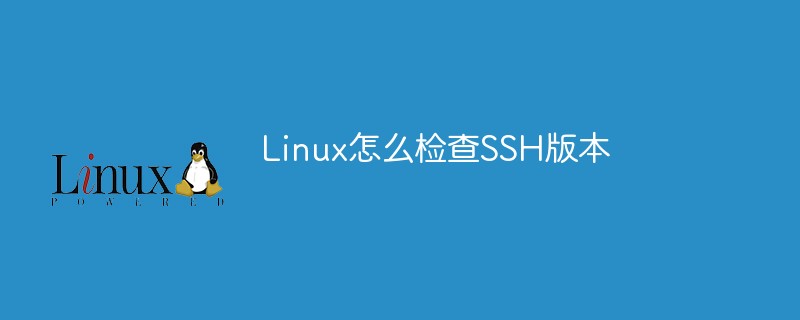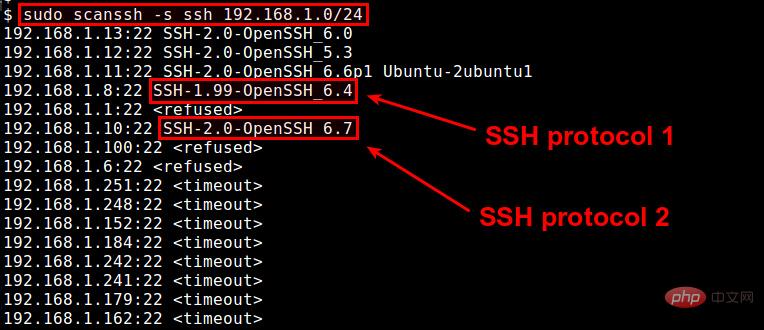How to check SSH version in Linux
Check method: 1. Open "/etc/ssh/sshd_config" with a text editor and check the "Protocol" field. If "Protocol 2" is displayed, it means that the server only supports SSH2. If "Protocol 1" is displayed It means that the server supports both at the same time. 2. Force ssh to use a specific SSH protocol and judge by checking the response of the SSH server. 3. Use the scanssh tool with the syntax "sudo scanssh -s ssh ip address".

#The operating environment of this tutorial: linux7.3 system, Dell G3 computer.
Secure Shell (SSH) allows remote login or remote execution of commands through an encrypted secure communication channel. SSH is designed to replace insecure plaintext protocols such as telnet, rsh, and rlogin. SSH provides a number of required features such as authentication, encryption, data integrity, authorization and forwarding/tunneling.
SSH exists in two versions 1 and 2 (SSH1 and SSH2). What's the difference between these two? How to check the SSH protocol version on Linux?
SSH1 vs. SSH2
There are some minor version differences in the SSH protocol specification, but there are two main major versions: SSH1 (version 1.XX) and SSH2 (version 2.00).
In fact, SSH1 and SSH2 are two completely different and incompatible protocols. SSH2 significantly improves many aspects of SSH1. First of all, SSH is a macro design. Several different functions (such as authentication, transmission, connection) are packaged into a single protocol. SSH2 brings more powerful security features than SSH1, such as MAC-based integrity check, flexible session key updates, fully negotiated encryption algorithms, public key certificates, and more.
SSH2 is standardized by the IETF, and its implementation is widely deployed and accepted in the industry. Due to the popularity and encryption advantages of SSH2 over SSH1, many products have dropped support for SSH1. At the time of writing this article, OpenSSH still supports SSH1 and SSH2, however in all modern Linux distributions, OpenSSH servers disable SSH1 by default.
Linux check SSH version
Method 1
If you want to check local OpenSSH server support For the SSH protocol version, you can refer to the file /etc/ssh/sshd_config. Open /etc/ssh/sshd_config with a text editor and look at the "Protocol" field.
If it is displayed as follows, it means that the server only supports SSH2.
Protocol 2
If it is displayed as follows, it means that the server supports both SSH1 and SSH2.
Protocol 1
Method 2
If you cannot access /etc/ssh/sshd_config because the OpenSSH service is running on the remote server. You can use an SSH client called ssh to check the supported protocols. Specifically, it forces ssh to use a specific SSH protocol, and then we check the response of the SSH server.
The following command forces ssh to use SSH1:
ssh -1 user@remote_server
The following command forces ssh to use SSH2:
ssh -2 user@remote_server
If the remote SSH server only supports SSH2, then the first one with " -1" option will cause an error message like the following:
Protocol major versions differ: 1 vs. 2
If the SSH server supports both SSH1 and SSH2, then both commands are valid.
Method 3
Another way to check the version is to run an SSH scanning tool called scanssh. This command line tool is useful when you want to check a group of IP addresses or an entire local network to upgrade an SSH1-compatible SSH server.
The following is the basic SSH version scanning syntax.
sudo scanssh -s ssh -n [ports] [IP addresses or CIDR prefix]
The "-n" option can specify the SSH port to scan. You can use Duhao separation to scan multiple ports. Without this option, scanssh will scan port 22 by default.
Use the following command to discover the SSH server in the 192.168.1.0/24 local network and check the SSH protocol v version:
sudo scan -s ssh 192.168.1.0/24

If scanssh is A specific IP address reports "SSH-1.XX-XXXX", which implies that the minimum version supported by the associated SSH server is SSH1. If the remote server only supports SSH2, scanssh will display "SSH-2.0-XXXX".
Related recommendations: "Linux Video Tutorial"
The above is the detailed content of How to check SSH version in Linux. For more information, please follow other related articles on the PHP Chinese website!

Hot AI Tools

Undresser.AI Undress
AI-powered app for creating realistic nude photos

AI Clothes Remover
Online AI tool for removing clothes from photos.

Undress AI Tool
Undress images for free

Clothoff.io
AI clothes remover

Video Face Swap
Swap faces in any video effortlessly with our completely free AI face swap tool!

Hot Article

Hot Tools

Notepad++7.3.1
Easy-to-use and free code editor

SublimeText3 Chinese version
Chinese version, very easy to use

Zend Studio 13.0.1
Powerful PHP integrated development environment

Dreamweaver CS6
Visual web development tools

SublimeText3 Mac version
God-level code editing software (SublimeText3)

Hot Topics
 1386
1386
 52
52
 How to use docker desktop
Apr 15, 2025 am 11:45 AM
How to use docker desktop
Apr 15, 2025 am 11:45 AM
How to use Docker Desktop? Docker Desktop is a tool for running Docker containers on local machines. The steps to use include: 1. Install Docker Desktop; 2. Start Docker Desktop; 3. Create Docker image (using Dockerfile); 4. Build Docker image (using docker build); 5. Run Docker container (using docker run).
 Difference between centos and ubuntu
Apr 14, 2025 pm 09:09 PM
Difference between centos and ubuntu
Apr 14, 2025 pm 09:09 PM
The key differences between CentOS and Ubuntu are: origin (CentOS originates from Red Hat, for enterprises; Ubuntu originates from Debian, for individuals), package management (CentOS uses yum, focusing on stability; Ubuntu uses apt, for high update frequency), support cycle (CentOS provides 10 years of support, Ubuntu provides 5 years of LTS support), community support (CentOS focuses on stability, Ubuntu provides a wide range of tutorials and documents), uses (CentOS is biased towards servers, Ubuntu is suitable for servers and desktops), other differences include installation simplicity (CentOS is thin)
 What to do if the docker image fails
Apr 15, 2025 am 11:21 AM
What to do if the docker image fails
Apr 15, 2025 am 11:21 AM
Troubleshooting steps for failed Docker image build: Check Dockerfile syntax and dependency version. Check if the build context contains the required source code and dependencies. View the build log for error details. Use the --target option to build a hierarchical phase to identify failure points. Make sure to use the latest version of Docker engine. Build the image with --t [image-name]:debug mode to debug the problem. Check disk space and make sure it is sufficient. Disable SELinux to prevent interference with the build process. Ask community platforms for help, provide Dockerfiles and build log descriptions for more specific suggestions.
 How to view the docker process
Apr 15, 2025 am 11:48 AM
How to view the docker process
Apr 15, 2025 am 11:48 AM
Docker process viewing method: 1. Docker CLI command: docker ps; 2. Systemd CLI command: systemctl status docker; 3. Docker Compose CLI command: docker-compose ps; 4. Process Explorer (Windows); 5. /proc directory (Linux).
 What computer configuration is required for vscode
Apr 15, 2025 pm 09:48 PM
What computer configuration is required for vscode
Apr 15, 2025 pm 09:48 PM
VS Code system requirements: Operating system: Windows 10 and above, macOS 10.12 and above, Linux distribution processor: minimum 1.6 GHz, recommended 2.0 GHz and above memory: minimum 512 MB, recommended 4 GB and above storage space: minimum 250 MB, recommended 1 GB and above other requirements: stable network connection, Xorg/Wayland (Linux)
 Detailed explanation of docker principle
Apr 14, 2025 pm 11:57 PM
Detailed explanation of docker principle
Apr 14, 2025 pm 11:57 PM
Docker uses Linux kernel features to provide an efficient and isolated application running environment. Its working principle is as follows: 1. The mirror is used as a read-only template, which contains everything you need to run the application; 2. The Union File System (UnionFS) stacks multiple file systems, only storing the differences, saving space and speeding up; 3. The daemon manages the mirrors and containers, and the client uses them for interaction; 4. Namespaces and cgroups implement container isolation and resource limitations; 5. Multiple network modes support container interconnection. Only by understanding these core concepts can you better utilize Docker.
 vscode cannot install extension
Apr 15, 2025 pm 07:18 PM
vscode cannot install extension
Apr 15, 2025 pm 07:18 PM
The reasons for the installation of VS Code extensions may be: network instability, insufficient permissions, system compatibility issues, VS Code version is too old, antivirus software or firewall interference. By checking network connections, permissions, log files, updating VS Code, disabling security software, and restarting VS Code or computers, you can gradually troubleshoot and resolve issues.
 What is vscode What is vscode for?
Apr 15, 2025 pm 06:45 PM
What is vscode What is vscode for?
Apr 15, 2025 pm 06:45 PM
VS Code is the full name Visual Studio Code, which is a free and open source cross-platform code editor and development environment developed by Microsoft. It supports a wide range of programming languages and provides syntax highlighting, code automatic completion, code snippets and smart prompts to improve development efficiency. Through a rich extension ecosystem, users can add extensions to specific needs and languages, such as debuggers, code formatting tools, and Git integrations. VS Code also includes an intuitive debugger that helps quickly find and resolve bugs in your code.




